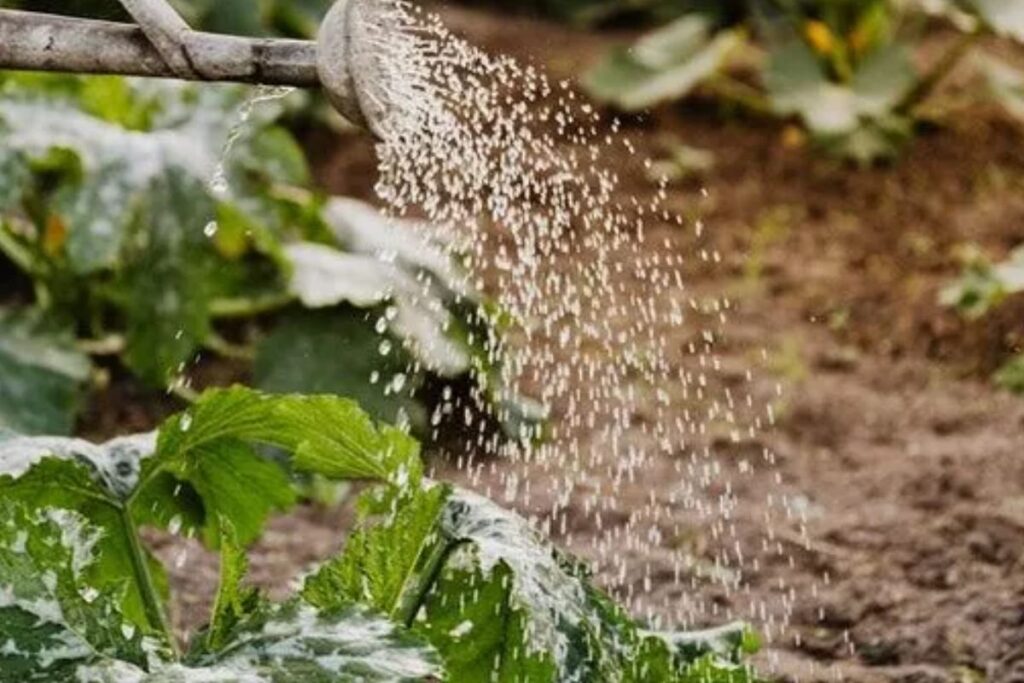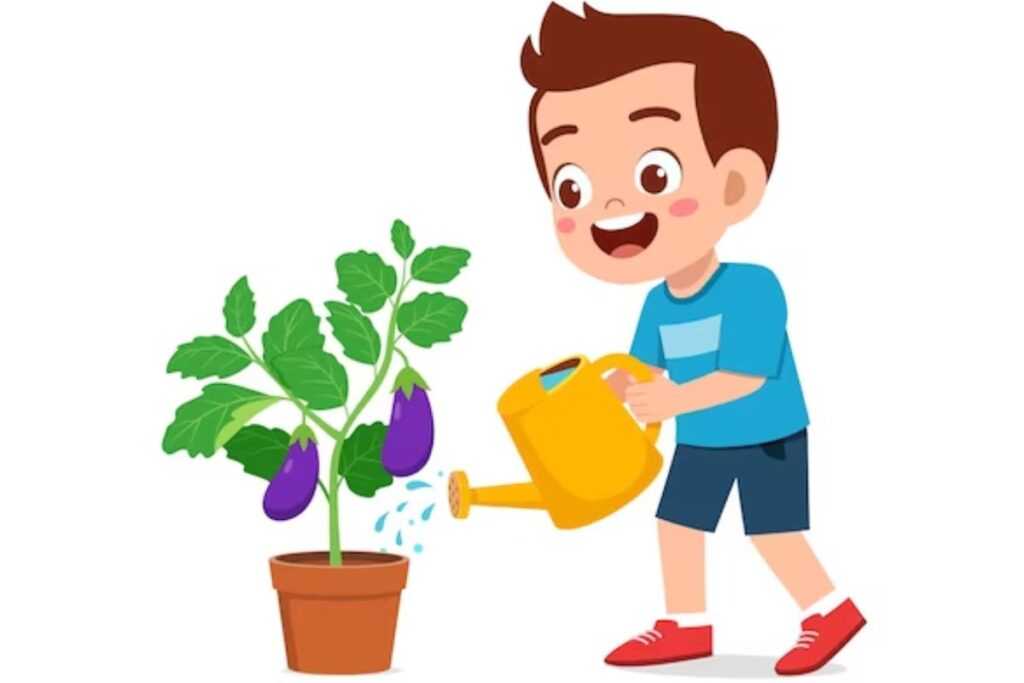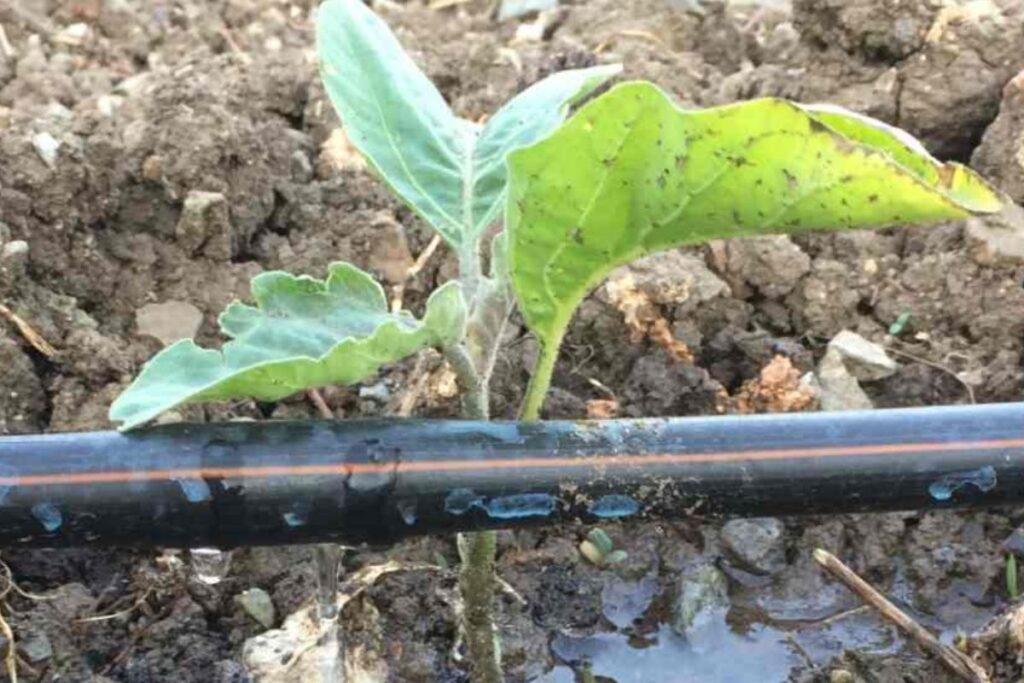If you’re looking to grow healthy, delicious eggplants in your garden, it’s important to master the art of eggplant watering. Keeping the soil at the right moisture level is essential so that your eggplants have the right environment to thrive.
In this guide, we’ll give you an overview of what optimal soil moisture looks like for eggplants and how to ensure your plants get the right amount of water.
With our tips, you’ll be well on your way to mastering eggplant watering and ensuring your eggplants stay healthy!
How Much Water Do Eggplants Need Per Day?

Eggplant plants require a consistent and adequate water supply to thrive. On average, an eggplant plant needs about 2 inches (approximately 0.2857 inches per day) of water weekly to support its growth and development.
To put it in perspective, this translates to approximately 7.25 milliliters of water per day. However, it’s important to note that the water needs of eggplants can vary based on factors such as climate, soil conditions, and plant size.
Monitoring the soil moisture levels and adjusting watering accordingly is crucial. Remember to provide sufficient water without overwatering, ensuring the soil remains consistently moist, but not waterlogged.
How To Water Eggplants? A Step-by-Step Guide

When it comes to eggplant water requirements, proper watering is key to ensuring healthy and abundant harvests. Follow these steps to water your eggplants effectively:
- Determine the appropriate amount of water: Eggplants generally require about an inch of water per week, but this can vary based on the size and maturity of the plant.
- Check the soil moisture: Before watering, check the soil moisture level by inserting a finger about an inch deep into the soil. If it feels dry, it’s time to water.
- Water deeply: When you water your eggplants, make sure to do so deeply and slowly to allow the water to penetrate the soil and reach the roots. Shallow watering can lead to weak root systems.
- Water at the base: To avoid wetting the leaves and causing diseases like fungal infections, water the eggplants at the base.
- Mulch the soil: To help retain moisture and regulate soil temperature, add a layer of mulch around the base of the eggplant.
- Use drip irrigation: Drip irrigation is a great way to water your eggplants slowly and consistently while also reducing the risk of overwatering.
By following these steps and keeping a close eye on your eggplants’ water requirements, you can ensure that they receive the optimal amount of water for healthy growth and maximum yields.
How often do water eggplants?
The frequency of watering aubergines depends on various factors such as soil type, temperature, and humidity. However, the general rule of thumb is to keep the soil evenly moist but not waterlogged.
Here are some tips to help you determine the ideal watering schedule for your eggplants:
- Water your eggplants deeply and slowly once or twice a week.
- Check the soil moisture regularly using a soil moisture meter or by inserting your finger into the soil to a depth of one inch.
- Water your eggplants more frequently during hot, dry weather conditions.
- Avoid watering your eggplants during periods of heavy rainfall or high humidity.
- Consider using mulch around your eggplants to retain soil moisture and prevent evaporation.
By following these watering aubergine tips, you can ensure that your eggplants receive the right amount of water to thrive and produce healthy fruits.
Related Reading:
- Growing Brinjal at Home: A Complete Guide
- Yellow Eggplant: The Uncommon and Nutritious Vegetable
- All About Black Beauty Eggplant: The Gorgeous Purple-Black Fruit
- How to Grow Eggplant on a Trellis?
- Top 5 Eggplant Growing Problems (and How to Fix Them)
Indicators that eggplants are getting too much or too little water
One of the key factors to consider when growing eggplants is meeting their water needs. However, it can be tricky to determine the optimal amount of water to provide them.
Here are some indicators to watch out for that can help you figure out if your eggplants are getting too much or too little water:
- Wilting leaves: When eggplants do not receive enough water, their leaves may start to wilt. If you notice this, it could be a sign that you need to increase the frequency of watering or adjust the amount of water you provide each time.
- Yellowing leaves: On the other hand, overwatering can cause the leaves to turn yellow. This can be a sign that the roots are getting too much moisture and are not able to absorb nutrients properly.
- Stunted growth: If your eggplants are not growing as expected, it could be due to inadequate or excess water. Lack of water can hinder their ability to absorb nutrients from the soil and grow, while too much water can cause the roots to rot and stunt their growth.
- Blossom-end rot: This is a condition where the bottom of the fruit turns brown and becomes sunken. It can be caused by inconsistent watering or calcium deficiency in the soil.
- Poor fruit quality: Inconsistent watering can also result in misshapen or small fruits, while overwatering can lead to the splitting of the fruits.
Keep an eye out for these indicators to ensure that you provide your eggplants with optimal aubergine water requirements.
Do Eggplants Require Lots of Water?
Eggplants are not considered water-intensive plants, but they still need consistent moisture to grow and produce well. The water requirement of eggplants will vary depending on various factors such as climate, soil type, and stage of growth.
In general, eggplants require an inch or 2 inches of water per week. This can be achieved through regular watering or a slow drip system. Eggplants prefer evenly moist soil, so avoid letting the soil dry out completely.
However, too much water can lead to root rot, so be cautious not to overwater. Regular monitoring of soil moisture and careful watering will ensure the healthy growth of eggplants.
Can You Overwater Eggplants?

No, you can’t overwater eggplants. Overwatering can lead to root rot and other fungal diseases that can stunt the growth and productivity of your eggplants. It’s important to monitor soil moisture levels and avoid letting the soil become too saturated.
Make sure the soil has good drainage and allow it to dry out slightly between waterings. In addition, avoid getting water on the leaves as this can increase the risk of disease.
Related Readings:
- Companion Planting Guide: Best Plants to Grow with Zucchini for Healthy and Bountiful Harvest
- Green Tomatoes: Exploring the Characteristics, Varieties, and Uses
- The Ultimate Guide to Growing Pumpkins in Grow Bags: Tips, Techniques, and Best Practices
- The Ultimate Guide To Growing Carrots In Your Garden
- How to Water Cucumber Plants?
How Do You Know If Eggplants Need Water?
One of the most common signs that your eggplants need water is drooping leaves. When eggplants do not have enough water, their leaves will wilt and droop, which is a clear indication that they need watering.
Additionally, the soil around the plant will become dry and may even start to pull away from the edges of the container or bed. If the top inch of soil feels dry to the touch, it is time to water your eggplants.
Keep in mind that overwatering can also harm eggplants, so be sure to water them appropriately and only when necessary.







